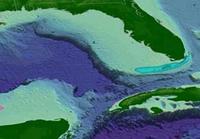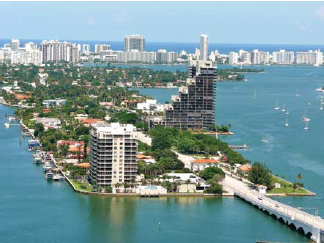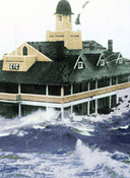|
|
|
FSU/COAPS to lead consortium in BP-funded oil spill research initiative
 The nation will be looking to FSU/COAPS and its expertise in the marine sciences as it studies the long-term after effects and changes in the Gulf of Mexico following last year's Deepwater Horizon oil spill. The Gulf of Mexico Research Initiative (GRI) announced that the FSU-led consortium "Deep-C: Deepsea to Coast Connectivity in the Eastern Gulf of Mexico" will receive roughly $20 million in research funds - $6.75 million each year for three years. The nation will be looking to FSU/COAPS and its expertise in the marine sciences as it studies the long-term after effects and changes in the Gulf of Mexico following last year's Deepwater Horizon oil spill. The Gulf of Mexico Research Initiative (GRI) announced that the FSU-led consortium "Deep-C: Deepsea to Coast Connectivity in the Eastern Gulf of Mexico" will receive roughly $20 million in research funds - $6.75 million each year for three years.
FSU lead researcher Eric Chassignet, director of FSU's Center for Ocean-Atmospheric Prediction Studies (COAPS), said the news "is exciting because it's recognition of a group effort by the amazing team we've put together. It's an interdisciplinary group consisting of geologists, biologists, chemists, physicists and meteorologists who will be examining how oil is dispersed into the deep ocean and can make it back up to the beaches. Observations will be combined with earth system and food web models in order to better evaluate the consequences of crude oil and gas released in the Gulf of Mexico." Read more... |
|
Sea level changes in the southeastern US
 A new report written for a general audience and produced by COAPS affiliates discusses past, present, and future sea levels in the Southeast. The report provides a basic explanation of the existence and physics of sea level variations and estimates a rise of 32 inches by 2100 as the best guess for sea level rise in south Florida. Download the report (PDF) A new report written for a general audience and produced by COAPS affiliates discusses past, present, and future sea levels in the Southeast. The report provides a basic explanation of the existence and physics of sea level variations and estimates a rise of 32 inches by 2100 as the best guess for sea level rise in south Florida. Download the report (PDF). |
|
La Niņa watch means more dry weather possible
The Southeast Climate Consortium and the National Oceanic and Atmospheric Association (NOAA) have issued a La Niņa watch, meaning it is more likely thannot that La Niņa will redevelop in the Pacific Ocean in the next one to three months. La Niņa typically brings fall and winter weather patterns to parts of the Southeast that are warmer and drier than normal. "Last year, the Pacific Ocean slipped into one of the strongest La Niņas on record and was a key trigger for the development of drought in Florida and the Southeast as well as unprecedented drought in Texas and Oklahoma," said state climatologist and COAPS scientist David Zierden. Read more...
|
|
Time-varying trend in global mean surface temperature
Two key questions in the climate debate are:
- How much of the recent warming can be attributed to natural variability versus anthropogenic forcing?
- Is the rate of warming in the latter half of the 20th century unusual or unprecedented?
A new paper published in Climate Dynamics by COAPS assistant professor Zhaohua Wu tackles both of these questions and estimates that up to one third of the late twentieth century warming could have been a consequence of natural variability. Read more...
|
|
New hurricane scale puts more focus on storm surge
 A newly patented hurricane scale--called Integrated Kinetic Energy, or IKE--better predicts the potential destruction from both wind and storm surge. Mark Powell, IKE co-creator and NOAA scientist stationed at COAPS, said the commonly used Saffir-Simpson Hurricane Wind Scale only takes estimated maximum wind speed into account in categorizing a hurricane. IKE, in contrast, also takes into account the stress that the winds exert on the ocean surface, which causes the waves that create the surge. Read USA Today article A newly patented hurricane scale--called Integrated Kinetic Energy, or IKE--better predicts the potential destruction from both wind and storm surge. Mark Powell, IKE co-creator and NOAA scientist stationed at COAPS, said the commonly used Saffir-Simpson Hurricane Wind Scale only takes estimated maximum wind speed into account in categorizing a hurricane. IKE, in contrast, also takes into account the stress that the winds exert on the ocean surface, which causes the waves that create the surge. Read USA Today article. |
|
Pirate booty: a monsoon cache
Among other things, the pirates attacking the shipping lanes off the coast of Somalia are robbing climate researchers of valuable data about Indian Ocean monsoons. COAPS scientists Shawn Smith and Mark Bourassa report that the increasingly frequent attacks in the Gulf of Aden and the Indian Ocean have changed the routes of international shipping in a way that has created a large "data hole" for some multidecadal studies of importance to the region. Read Discovery News article.
|
Environmental Minute is a radio segment co-sponsored by the Florida State University and the Florida Climate Institute and organized by COAPS scientist Vasu Misra. Environmental Minute broadcasts each Monday & Wednesday at 10:04am on WFSU-FM. For more information, visit wfsu.org/environmental.
Recent segments by COAPS scientists:
|
|
|
|
|
About COAPS
The Florida State University Center for Ocean-Atmospheric Prediction Studies (COAPS) is a center of excellence performing interdisciplinary research in ocean-atmosphere-land-ice interactions to increase our understanding of the physical, social, and economic consequences of climate variability. COAPS scientists and students come from a wide range of disciplines, including meteorology, physical oceanography, statistics, and the computer and information sciences.
|
|
|
|